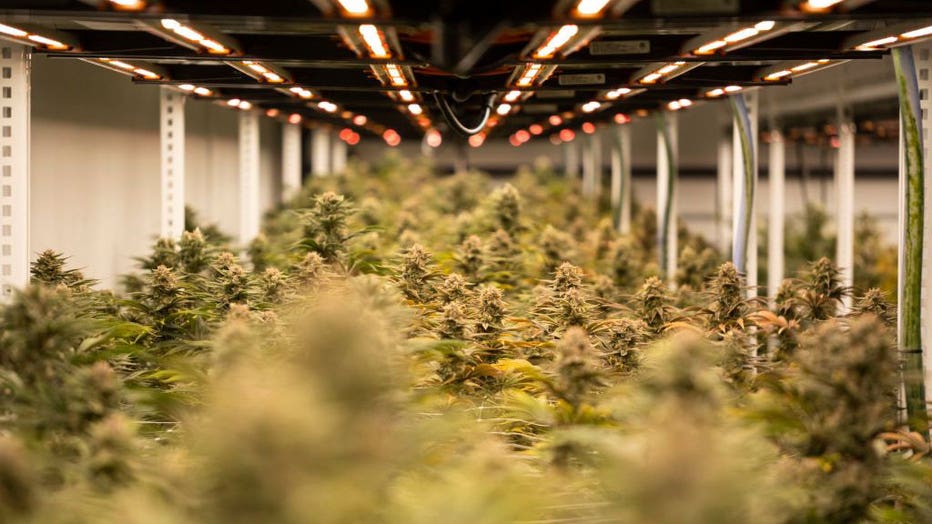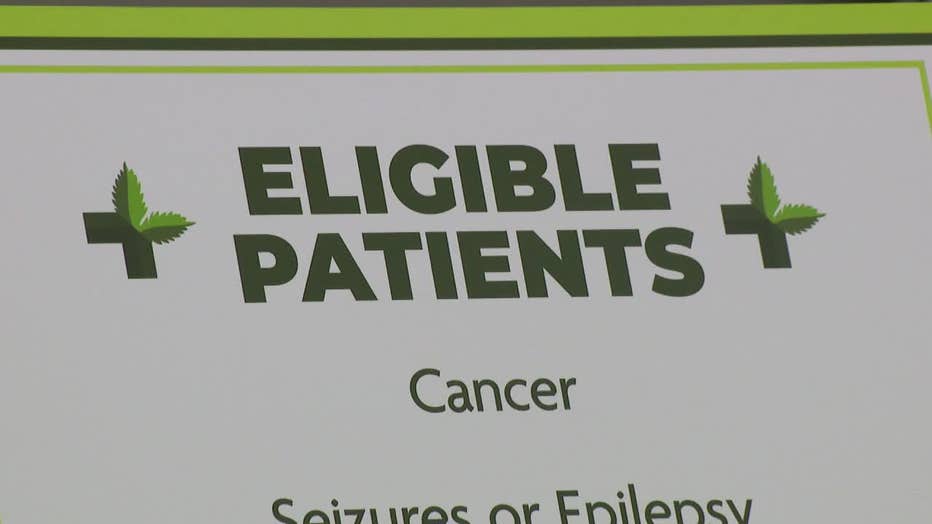Wisconsin Republicans unveil medical marijuana bill

New medical marijuana bill
Wisconsin Republicans on Monday, Jan. 8 unveiled a restrictive plan to legalize medical marijuana in the state.
MADISON, Wis. - Neighboring states allow marijuana use, but not the Badger State. Now, medical marijuana could be coming to Wisconsin, if a new bill becomes law. Assembly Republicans rolled out the proposal on Monday, Jan. 8.
SIGN UP TODAY: Get daily headlines, breaking news emails from FOX6 News
The bill would allow marijuana usage only for people with certain medical issues. It would regulate every stage from growing to processing to testing and the state would hold all of those locations confidential.

Rows of medical marijuana plants are grown under controlled day-light bulbs at the Cannabist medical marijuana growing facility. (Billy Schuerman/The Virginian-Pilot/Tribune News Service via Getty Images)
Then, patients would have to pick it up from a state-run dispensary. The bill would not allow the marijuana to be smoked, but would allow it to be eaten, or found in gels, vapors or patches.
"What we are proposing today is not a panacea, not a magic cure for people who deal with awful conditions, but it’s another way for people to get treatment in a way that will hopefully be less addictive, more impactful, and hopefully have less side effects than the constant and chronic use of opioids," Assembly Speaker Robin Vos said.
The patients would pay a fee of $100 a year to get a card that would allow them to purchase marijuana at one of five state-controlled dispensaries. The state would also regulate growers, including that the marijuana be grown in an enclosed, locked facility. Growers would also pay the initial license fee of $10,000.
The state initially would contract with one processor until the state sees 50,000 patients. The processor would need to have products sent to a lab for testing, and pay the initial license fee of $50,000.
"This bill would have been okay about 15 years ago, but we have a lot of data since then that shows it’s the right thing to do to reduce barriers, rather than put more obstacles in place, as this one does," said State Rep. Ryan Clancy (D-Milwaukee). "This would be easier under this legislation for folks just to drive across the border to Illinois and get the marijuana there and bring it back, then I think jump through all the hoops they put in place."
People diagnosed with the following could get marijuana in the state:
- Cancer
- HIV or AIDS
- Seizures and epilepsy
- Post-traumatic stress disorder
- Alzheimer's disease
- Glaucoma
- Severe chronic pain
- Severe chronic nausea
- Severe muscle spasms
- Multiple sclerosis
- Amyotrophic lateral sclerosis
- Chronic motor or vocal tic disorder
- Tourette syndrome
- Inflammatory bowel disease
- Any terminal illness with a probable life expectancy of less than one year

"There is strong evidence for several of those conditions that cannabis use for medical reasons, such as THC or cannabidiol or CBD that people use, that there’s strong evidence for conditions such as nausea in cancer patients, chronic pain, as well as pain and muscle sparsity in things like multiple sclerosis," University of Wisconsin-Milwaukee psychology professor Krista Lisdahl said.
As far as other conditions, the UWM researcher who has written on marijuana use said there's still a need for more research. "There’s some preliminary science for some of the conditions. One of them that struck me was perhaps something like Alzheimer’s disease and aging effects in memory disorders. That evidence needs to get a little stronger, but, I think having a bill that would allow more research as well as more clinical use of cannabis in Wisconsin might actually help support use for those conditions."
FREE DOWNLOAD: Get breaking news alerts in the FOX6 News app for iOS or Android.
"Actually, there’s been a lot of barriers to cannabis research and increasing legalization, even for medicinal purposes, does seem to increase the opportunities for research," Lisdahl added.
She said it's important to consult with a doctor about usage, as the products can effect various systems in the body, including the immune system, liver function and heart function. Marijuana products can also interact with medication, she added.
For the medical marijuana bill to become law, it would take joint passage in the Wisconsin Assembly and Wisconsin Senate. It would then head to the governor’s desk.

Senate Majority Leader Devin LeMahieu said last year that medical marijuana could pass.
In reaction to the new proposal, he stated: "The Assembly’s medical marijuana proposal will move through the normal legislative process, including committee action, before being considered by the full Senate. The specific details of the proposal are important and need to be thoroughly vetted before the Senate decides how to proceed."
Gov. Tony Evers has pushed for full legalization. His spokeswoman said he was reviewing the latest proposal, while fellow Democrats said the proposal didn't go far enough.
"I'm glad that the Republicans have finally seen the writing on the wall. The last time this was on the ballot just a few years ago, 74% of Milwaukee County residents want to see it legalized, but they want to see it fully legalized," said Clancy.
"You look at what’s happened in Illinois, Michigan, and Minnesota, all around us, and I think it’s fair to say that the ramifications of recreational marijuana have had very few positive side effects," Vos said.
All three of those neighboring states allow marijuana for recreational use. The Wisconsin Legislative Fiscal Bureau estimates Wisconsinites in 2022 paid $36 million in sales tax in Illinois for marijuana.
The Wisconsin bill would exempt the state's medical marijuana from the sales tax.
"I think the family needs it more than we do," Vos said.

